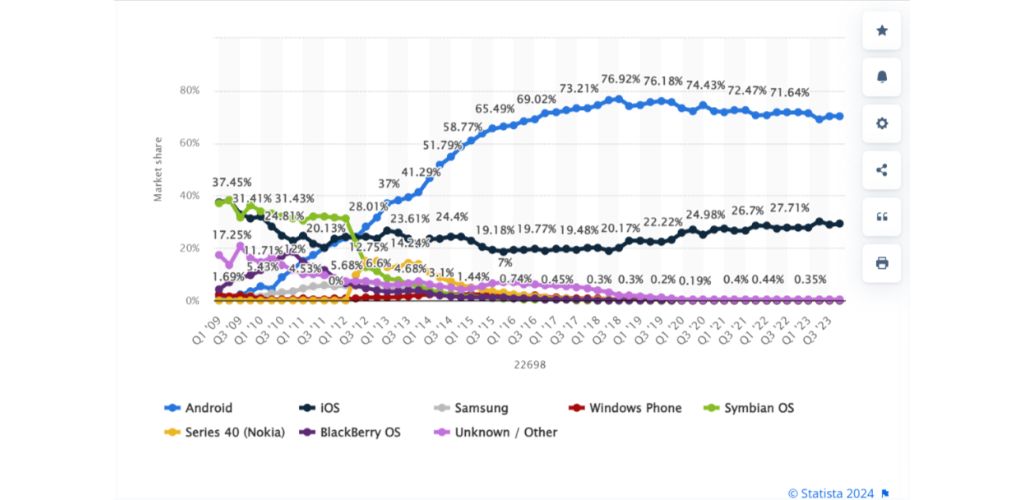Introduction:
In the fast-paced world of mobile app development, choosing the right platform is crucial for the success of any project. With the ever-growing popularity of smartphones, developers are faced with the decision of whether to build their app for Android, iOS, or opt for a hybrid approach. Each platform has its own set of advantages and limitations, particularly in terms of performance, cost, and time-to-market. Let’s delve into these factors to help you make an informed decision. But before that let’s look at some statistics:
1. Market Share (Global Smartphone OS Market Share – Q4 2021):
- Android: 71.74%
- iOS: 27.04%
- Others: 1.22% (Source: StatCounter)
2. Number of Apps Available:
- Android: Over 3.48 million apps available on Google Play Store (as of December 2021)
- iOS: Over 2.22 million apps available on the Apple App Store (as of December 2021)
- Developer Revenue:iOS apps generate higher revenue compared to Android apps despite having a smaller market share. In 2021, the global iOS app revenue reached $64.9 billion, while Android app revenue was $40.3 billion. (Source: Sensor Tower)
3. Development Language Popularity:
- Java and Kotlin are the primary languages used for Android app development.
- Swift and Objective-C are the primary languages used for iOS app development.
- JavaScript, HTML, and CSS are commonly used for hybrid app development.
4. Average Development Time:
- Native app development typically takes longer compared to hybrid app development due to the need for separate codebases for Android and iOS.
- Hybrid app development can significantly reduce development time by allowing developers to write code once and deploy it across multiple platforms.

Certain factors are responsible for the popularity and acceptance of each: Android, iOS, and Hybrid apps. However, we will look at the most specific ones along wth the pros and cons of each that impact the demand for mobile app development.
Pros and Cons of Android, iOS, And Hybrid App Development
| Aspect | Android Apps | iOS Apps | Hybrid Apps |
| Pros | |||
| Development Language | Java, Kotlin | Swift, Objective-C | HTML, CSS, JavaScript (Web Technologies) |
| Performance | Direct access to device features and APIs | Smooth performance due to optimized OS | Cross-platform compatibility |
| Market Share | Largest global market share | High user engagement and spending | Single codebase for multiple platforms |
| Ecosystem | Vast ecosystem with diverse device range | Strict guidelines ensure quality standards | Access to native device features |
| Cons | |||
| Fragmentation | Device and OS fragmentation | Limited device range | Performance may lag behind native apps |
| Development Time | Longer development cycles due to a variety | Strict app review process may lead to delays | Balancing native and web technologies |
| Cost | Higher development and testing costs | Expensive hardware and development tools | Maintenance overhead may increase over time |
This table provides a brief overview of the key advantages and disadvantages associated with developing apps for Android, iOS, and using hybrid frameworks. It’s important to note that the suitability of each approach depends on specific project requirements, budget constraints, and target audience preferences.
Factors Affecting App Development System Software Selection
1. Performance:
Performance is a critical aspect of any mobile application, directly impacting user satisfaction and engagement. Native apps, developed specifically for a particular platform using its native programming language and tools, often deliver superior performance compared to hybrid apps.
Native Android and iOS apps are optimized to take full advantage of the respective platform’s hardware and software capabilities. For instance, Android apps are typically written in Java or Kotlin, while iOS apps are developed using Swift or Objective-C. This direct access to platform-specific features and APIs allows native apps to deliver smooth animations, fast load times, and seamless interactions, providing users with a highly responsive and immersive experience.
On the other hand, hybrid apps, built using web technologies like HTML, CSS, and JavaScript, wrapped within a native container, may face performance challenges. While hybrid frameworks such as React Native and Flutter have made significant advancements in minimizing the performance gap between native and hybrid apps, they may still struggle with demanding tasks such as intensive graphics rendering or complex computations. Additionally, hybrid apps may experience slight delays in responsiveness and user interface interactions compared to their native counterparts.
However, it’s essential to note that the performance difference between native and hybrid apps may vary depending on the specific requirements of the application and the efficiency of the hybrid framework used. For less resource-intensive applications or those with simpler user interfaces, hybrid development can still provide satisfactory performance while offering the advantage of code reusability across multiple platforms. Ultimately, the choice between native and hybrid development should consider the performance requirements and trade-offs that best align with the project goals and user expectations.
2. Cost:
Cost plays a pivotal role in the decision-making process for app development projects. Native app development for both Android and iOS platforms entails creating separate codebases tailored to each operating system’s requirements. This necessitates developers with expertise in both Android and iOS development, leading to higher labor costs. Additionally, maintaining two codebases incurs ongoing expenses for bug fixes, updates, and feature enhancements, further contributing to the overall project cost.
In contrast, hybrid app development presents an appealing cost-saving opportunity. By leveraging frameworks like React Native, Flutter, or Ionic, developers can write code once using web technologies such as HTML, CSS, and JavaScript and deploy it across multiple platforms. This unified codebase streamlines the development process, reducing the need for specialized developers for each platform and minimizing labor costs. Furthermore, hybrid development often results in shorter development cycles, translating to lower project costs due to reduced time spent on coding and testing.
However, it’s essential to consider the long-term implications of hybrid app development. While initial development costs may be lower, maintenance and performance optimization can incur additional expenses over time. Hybrid apps may require ongoing updates to remain compatible with evolving operating systems and device specifications, potentially leading to higher maintenance costs compared to native apps. Additionally, optimizing hybrid apps for performance across different platforms may necessitate additional development resources and expertise, impacting the overall project budget.
Ultimately, the decision between native and hybrid app development should consider the trade-offs between upfront costs and long-term maintenance expenses, as well as factors such as project complexity, time-to-market requirements, and target audience preferences. By carefully evaluating these considerations, businesses can make informed decisions that align with their budgetary constraints and project objectives.
3. Time-to-Market:
In today’s fiercely competitive app market, being first to market can often translate into a significant advantage. The speed at which a product can be developed and launched can determine its success or failure. This aspect, known as time-to-market, is a critical consideration for businesses looking to capitalize on market opportunities and meet consumer demand promptly.
Native app development, while offering unparalleled performance and user experience, typically involves longer development cycles. This is primarily due to the necessity of creating separate codebases for Android and iOS platforms, each requiring tailored development efforts. Additionally, the need for thorough testing and optimization further extends the time required to bring a native app to market. While native apps are known for their robustness and platform-specific optimizations, the extended development timeline can potentially delay product launches and hinder the ability to capitalize on market trends.
In contrast, hybrid app development presents a compelling solution for businesses seeking to expedite their time-to-market. By leveraging frameworks such as React Native and Flutter, developers can write code once and deploy it across multiple platforms, eliminating the need for separate codebases. This unified approach streamlines the development process, reducing development time and accelerating the path to market. With the ability to reuse code across platforms, hybrid app development offers a significant advantage in terms of speed and efficiency. However, it’s crucial to strike a balance between speed and quality. While hybrid development can expedite time-to-market, rushing the development process may result in compromises in performance and user experience. Therefore, it’s essential to prioritize thorough testing and optimization to ensure that the app meets the highest standards of quality and functionality.
Time-to-market is a critical consideration in app development, and the choice between native and hybrid approaches can significantly impact the speed at which a product can be launched. While native development offers robustness and platform-specific optimizations, hybrid development presents a faster path to market with its unified codebase approach. Ultimately, businesses must carefully evaluate their priorities and objectives to determine the most suitable development approach that aligns with their time-to-market goals.

In conclusion:
Deciding between Android, iOS, and hybrid app development requires careful consideration of performance, cost, and time-to-market. Native app development offers superior performance but can be more expensive and time-consuming. Hybrid app development offers cost and time savings but may sacrifice performance in certain scenarios. Ultimately, the right choice depends on your specific project requirements, budget, and timeline. By weighing these factors carefully, you can choose the development approach that best aligns with your goals and objectives.
Recommended Articles
- https://www.rankfirms.com/benefits-b2b-platform-listings-for-businesses/
- https://www.rankfirms.com/creative-strategies-e-commerce-business-ideas-startup/
- https://www.rankfirms.com/elearning-software-development-ideas/
- https://www.rankfirms.com/best-healthcare-app-development-ideas-for-entrepreneurs/
- https://www.rankfirms.com/magento-vs-shopify-which-is-best-e-commerce-platform/








